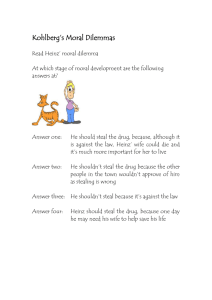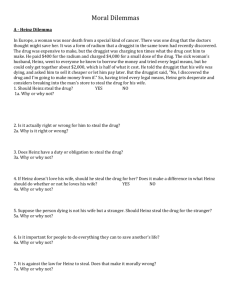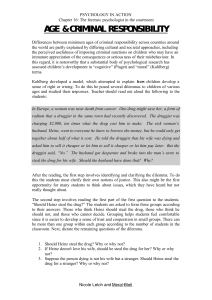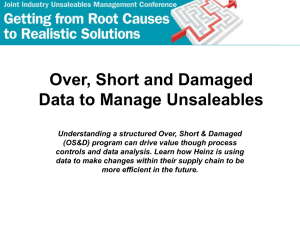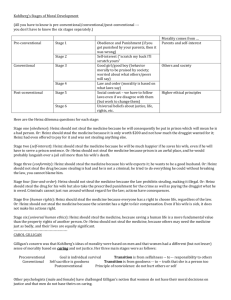Kohlberg Dilemmas for Students
advertisement
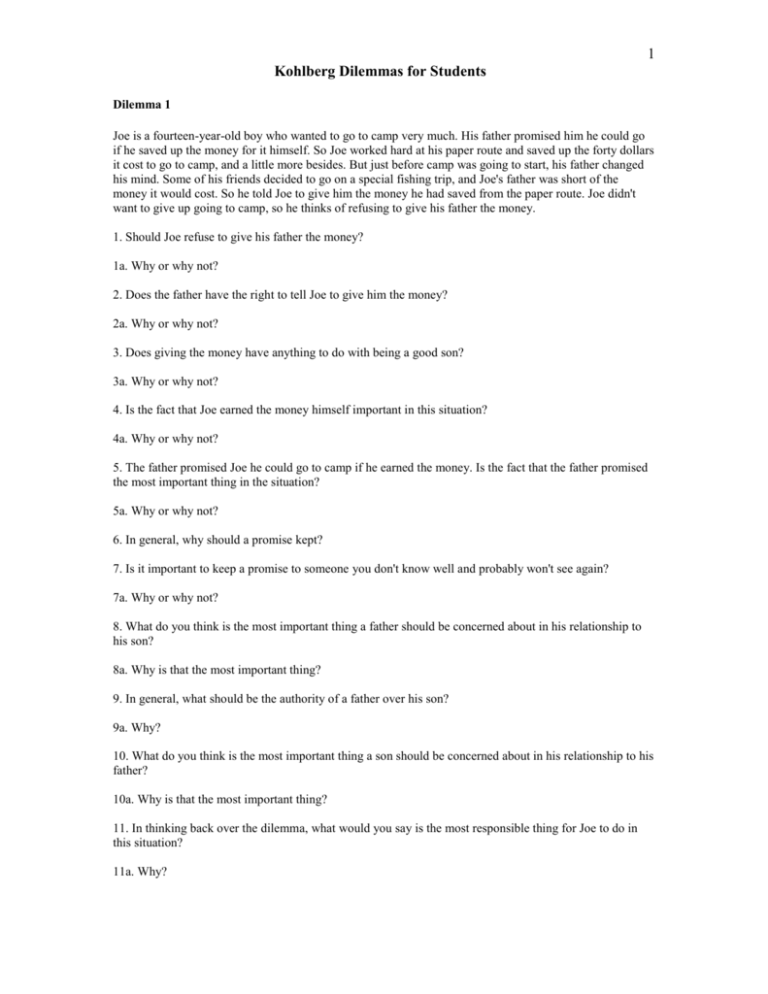
1 Kohlberg Dilemmas for Students Dilemma 1 Joe is a fourteen-year-old boy who wanted to go to camp very much. His father promised him he could go if he saved up the money for it himself. So Joe worked hard at his paper route and saved up the forty dollars it cost to go to camp, and a little more besides. But just before camp was going to start, his father changed his mind. Some of his friends decided to go on a special fishing trip, and Joe's father was short of the money it would cost. So he told Joe to give him the money he had saved from the paper route. Joe didn't want to give up going to camp, so he thinks of refusing to give his father the money. 1. Should Joe refuse to give his father the money? 1a. Why or why not? 2. Does the father have the right to tell Joe to give him the money? 2a. Why or why not? 3. Does giving the money have anything to do with being a good son? 3a. Why or why not? 4. Is the fact that Joe earned the money himself important in this situation? 4a. Why or why not? 5. The father promised Joe he could go to camp if he earned the money. Is the fact that the father promised the most important thing in the situation? 5a. Why or why not? 6. In general, why should a promise kept? 7. Is it important to keep a promise to someone you don't know well and probably won't see again? 7a. Why or why not? 8. What do you think is the most important thing a father should be concerned about in his relationship to his son? 8a. Why is that the most important thing? 9. In general, what should be the authority of a father over his son? 9a. Why? 10. What do you think is the most important thing a son should be concerned about in his relationship to his father? 10a. Why is that the most important thing? 11. In thinking back over the dilemma, what would you say is the most responsible thing for Joe to do in this situation? 11a. Why? 2 Dilemma 2 Judy was a twelve-year-old girl. Her mother promised her that she could go to a special rock concert coming to their town if she saved up from baby-sitting and lunch money to buy a ticket to the concert. She managed to save up the fifteen dollars the ticket cost plus another five dollars. But then her mother changed her mind and told Judy that she had to spend the money on new clothes for school. Judy was disappointed and decided to go to the concert anyway. She bought a ticket and told her mother that she had only been able to save five dollars. That Saturday she went to the performance and told her mother that she was spending the day with a friend. A week passed without her mother finding out. Judy then told her older sister, Louise, that she had gone to the performance and had lied to her mother about it. Louise wonders whether to tell their mother what Judy did. 1. Should Louise, the older sister, tell their mother that Judy lied about the money or should she keep quiet? 1a. Why? 2. In wondering whether to tell, Louise thinks of the fact that Judy is her sister. Should that make a difference in Louise's decision? 2a. Why or why not? 3. Does telling have anything to do with being a good daughter? 3a. Why or why not? 4. Is the fact that Judy earned the money herself important in this situation? 4a. Why or why not? 5. The mother promised Judy she could go to the concert if she earned the money. Is the fact that the mother promised the most important thing in the situation? 5a. Why or why not? 6. Why in general should a promise be kept? 7. Is it important to keep a promise to someone you don't know well and probably won't see again? 7a. Why or why not? 8. What do you think is the most important thing a mother should be concerned about in her relationship to her daughter? 8a. Why is that the most important thing? 9. In general, what should be the authority of a mother over her daughter? 9a. Why? 10. What do you think is the most important thing a daughter should be concerned about in her relationship to her mother? 10a. Why is that the most important thing? 11. In thinking back over the dilemma, what would you say is the most responsible thing for Louise to do in this situation? 11a. Why? 3 Dilemma 3 In Europe, a woman was near death from a special kind of cancer. There was one drug that the doctors thought might save her. It was a form of radium that a druggist in the same town had recently discovered. the drug was expensive to make, but the druggist was charging ten times what the drug cost him to make. He paid $400 for the radium and charged $4,000 for a small dose of the drug. The sick woman's husband, Heinz, went to everyone he knew to borrow the money and tried every legal means, but he could only get together about $2,000, which is half of what it cost. He told the druggist that his wife was dying, and asked him to sell it cheaper or let him pay later. But the druggist said, "No, I discovered the drug and I'm going to make money from if." So, having tried every legal means, Heinz gets desperate and considers breaking into the man's store to steal the drug for his wife. 1. Should Heinz steal the drug? 1a. Why or why not? 2. Is it actually right or wrong for him to steal the drug? 2a. Why is it right or wrong? 3. Does Heinz have a duty or obligation to steal the drug? 3a. Why or why not? 4. If Heinz doesn't love his wife, should he steal the drug for her? Does it make a difference in what Heinz should do whether or not he loves his wife? 4a. Why or why not? 5. Suppose the person dying is not his wife but a stranger. Should Heinz steal the drug for the stranger? 5a. Why or why not? 6. Suppose it's a pet animal he loves. should Heinz steal to save the pet animal? 6a. Why or why not? 7. Is it important for people to do everything they can to save another's life? 7a. Why or why not? 8. It is against the law for Heinz to steal. Does that make it morally wrong? 8a. Why or why not? 9. In general, should people try to do everything they can to obey the law? 9a. Why or why not? 9b. How does this apply to what Heinz should do? 10. In thinking back over the dilemma, what would you say is the most responsible thing for Heinz to do? 10a. Why? 4 Dilemma 4 Two young men, brothers, had got into serious trouble. They were secretly leaving town in a hurry and needed money. Karl, the older one, broke into a store and stole a thousand dollars. Bob, the younger one, went to a retired old man who was known to help people in town. He told the man that he was very sick and that he needed a thousand dollars to pay for an operation. Bob asked the old man to lend him the money and promised that he would pay him back when he recovered. Really Bob wasn't sick at all, and he had no intention of paying the man back. Although the old man didn't know Bob very well, he lent him the money. So Bob and Karl skipped town, each with a thousand dollars. 1a. Which is worse, stealing like Karl or cheating like Bob? 1b. Why is that worse? 2. What do you think is the worst thing about cheating the old man? 2a. why is that the worst thing? 3. In general, why should a promise be kept? 4. Is it important to keep a promise to someone you don't know well or will never see again? 4a. Why or why not? 5. Why shouldn't someone steal from a store? 6. What is the value or importance of property rights? 7. Should people do everything they can to obey the law? 7a. Why or why not? 8. Was the old man being irresponsible by lending Bob the money? 8a. Why or why not?
